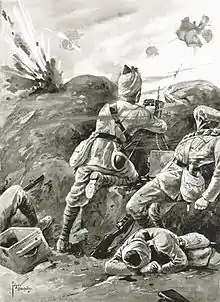Khudadad Khan
Khudadad Khan, VC (20 October 1888 – 8 March 1971) was the first soldier of the British Indian Army[1][2] to become the recipient of the Victoria Cross, the highest military award for gallantry in the face of the enemy given to British and Commonwealth forces. On 31 October 1914, at Hollebeke, Belgium, 26-year-old Khan, then serving in the British Indian Army, performed an act of bravery for which he was awarded the Victoria Cross during the First World War.
Khudadad Khan | |
|---|---|
 Depiction of Khudadad Khan manning machine gun on 31 October 1914. | |
| Born | 20 October 1888 Dab, Punjab, British India (now Chakwal, Pakistan) |
| Died | 8 March 1971 (aged 82) Mandi Bahauddin, Punjab, Pakistan |
| Allegiance | |
| Service/ | |
| Rank | Subedar |
| Unit | 129th Duke of Connaught's Own Baluchis |
| Battles/wars | First World War |
| Awards | |
A statue of Khudadad Khan is at the entrance of the Pakistan Army Museum in Rawalpindi.[3]
Details
Born on 20 October 1888 into a Muslim Minhas rajput family[4] in the village of Dab in Chakwal District of the Punjab Province, British India (now Pakistan), Khudadad Khan was a Sepoy in the 129th Duke of Connaught's Own Baluchis, British Indian Army (now 11th Battalion The Baloch Regiment of Pakistan Army). The battalion formed part of the Indian Corps, which was sent to France in 1914, to shore up the British forces fighting on the Western Front during the First World War.
In October 1914, when the Germans launched the First Battle of Ypres, the newly arrived 129th Baluchis were rushed to the frontline to support the hard-pressed British troops. On 31 October, two companies of the Baluchis bore the brunt of the main German attack near the village of Gheluvelt in Hollebeke Sector. The out-numbered Baluchis fought gallantly but were overwhelmed after suffering heavy casualties. Sepoy Khudadad Khan's machine-gun team, along with one other, kept their guns in action throughout the day, preventing the Germans from making the final breakthrough. The other gun was disabled by a shell and eventually Khudadad Khan's own team was overrun. All the men were killed by bullets or bayonets except Khudadad Khan who, despite being badly wounded, had continued working his gun. He was left for dead by the enemy but managed to crawl back to his regiment during the night. Thanks to his bravery, and that of his fellow Baluchis, the Germans were held up just long enough for Indian and British reinforcements to arrive. They strengthened the line, and prevented the German Army from reaching the vital ports; Khan was awarded the Victoria Cross.[5][6]
Khudadad Khan retired as a Subedar. He died in 1971 and is buried in Chak No. 25, Mandi Bahauddin. His Victoria Cross is on display at his ancestral house in Village Dab (Chakwal), Pakistan.[note 1]
In 2016 a play by Ishy Din, Wipers, about Khudadad Khan's feat was put on in Leicester.
Official citation
His Majesty the KING-EMPEROR has been graciously pleased to approve of the grant of the Victoria Cross to the undermentioned soldier of the Indian Army for conspicuous bravery whilst serving with the Indian Army Corps, British Expeditionary Force: —
4050, Sepoy Khudadad, 129th Duke of Connaught's Own Baluchis.
On 31st October, 1914, at Hollebeke, Belgium, the British Officer in charge of the detachment having been wounded, and the other gun put out of action by a shell, Sepoy Khudadad, though himself wounded, remained working his gun until all the other five men of the gun detachment had been killed.
— London Gazette, 7 December 1914.[9]
He was awarded the medal on the same day as Darwan Singh Negi VC; but is regarded as the first Indian recipient, as the latter's VC action was of later date.
Footnotes
- There is some controversy as to whether the medal on display is genuine. According to contemporary newspaper reports Khudadad Khan's original VC was stolen from him in Rawalpindi in 1950, and a police report was lodged at that time but the medal was never recovered. In 2011, there were reports in Pakistan that the original VC was 'for confidential sale' with a jeweller in Haripur area.[7][8]
References
- Citations
- "Khudadad Khan and Ghulam Haider of the 129th (Duke of Connaught's Own) Baluchis". Commonwealth War Graves Commission. Archived from the original on 15 August 2015. Retrieved 31 August 2015.
- Makepeace, Margaret (31 October 2014). "Award of Victoria Cross to Khudadad Khan". Untold lives blog. British Library. Retrieved 7 August 2017.
- "Subedar Khuda Dad Khan". Pakistan Army Museum Collections. Retrieved 27 February 2012.
- "Medals of Honour". Emel. No. 62. November 2009. Retrieved 13 September 2014.
- Thatcher (1932), pp. 13–17.
- Ahmed (1998), pp. 173–178.
- "Victoria Cross 1914 for sale". OLX. Archived from the original on 10 July 2012. Retrieved 25 April 2012.
- "National Treasure for Sale". omrite.blogspot. 11 March 2011. Retrieved 25 April 2012.
- "No. 28999". The London Gazette (Supplement). 7 December 1914. p. 10425.
- Bibliography
- Thatcher, W. S. (1932). The Fourth Battalion, Duke of Connaught's Own, Tenth Baluch Regiment in the Great War. Cambridge: The University Press. ISBN 1-84734-752-5.CS1 maint: ref=harv (link)
- Ahmed, Maj.-Gen. Rafiuddin (1998). History of the Baloch Regiment 1820-1939. Abbottabad: The Baloch Regimental Centre. ISBN 1-84734-130-6.CS1 maint: ref=harv (link)
- Qureshi, Lt.-Col. I. A. (1966). History of 11th Battalion, the Baluch Regiment. Lahore: The Allied Press.CS1 maint: ref=harv (link)
- Harvey, David (1999). Monuments to Courage. Kevin & Kay Patience.CS1 maint: ref=harv (link)
- The Register of the Victoria Cross (3rd ed.). This England. 1997. ISBN 978-0-906324-27-1.CS1 maint: ref=harv (link)
- Gliddon, Gerald (1994). VCs of the First World War - 1914. Budding Books. ISBN 978-1-84015-006-3.CS1 maint: ref=harv (link)
External links
- "Sepoy Khuda Dad Khan". The Victoria Cross (in India) (1912–1947). Rock Hill, South Carolina: Winthrop University. Archived from the original on 30 September 2007.